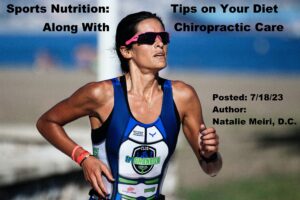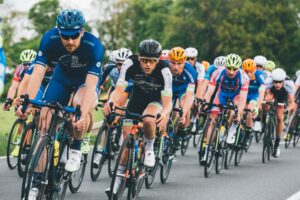
A Chiropractor in West Palm Beach can help you with many ailments by way of adjustments. However, the food you consume on a daily basis has a very large impact on your body and the thousands of underlying processes that go on inside it every day. Nutrition is certainly a significant factor in your health. So some of your lifestyle choices outside of the doctor’s office can influence the effectiveness of treatment. When you eat well, your immune system fights off illness better, you elevate your brain function, and your energy soars. By incorporating certain foods into your diet, you can contribute to faster healing, continued wellness and peak performance.
In this post we will look at Sports Nutrition: Tips on Your Diet Along With Chiropractic Care.
-
Calories
Firstly, athletes training for a competition need more calories than the average person. Early fatigue, muscle tissue loss and amenorrhea (absence of menstrual periods for 3 months or more) in women may occur with inadequate calorie intake. Some athletes will decrease calorie intake to compete in lower weight categories or to attain certain body shapes. This can impair performance and have other side effects.
Secondly, programs for weight gain or weight loss should be gradual with a 2 lb/wk change. And the change should improve lean to fat ratio (lean tissue to body fat) of body composition.
Thirdly, you can use a formula for finding the ideal energy/calorie requirements: body weight x C (30 for kids and 24 for adults) + type of exercise:
golf 3.6-4.8, baseball 4.1-5.3, basketball 6.0-8.5, dancing 3.6-4.8, running 9.7-17.2, swimming 3.4-9.7, tennis 6.0-8.5, wrestling 11.1 and walking 2.9-5.8, rowing 12.0, volleyball 4.8-8.5, soccer 7.8, cycling 4.8-9.7, football 7.3, mountain climbing 8.7, skating 4.8-8.7, skiing downhill 8.5, skiing cross country 9.7, handball 8.5

-
Carbohydrates
Carbohydrates (fiber, starches and sugars) are important for athletes in intense, strenuous training. You will need glucose to give you the energy to finish your training or competition. It should make up a majority of your diet to sustain the activities (60-70% of total calories in the diet). Avoid processed, refined (e.g. white flour) and high carb foods (e.g. potato chips, sugary deserts). Choose healthier fruits, vegetables, sweet potatoes and whole grains (e.g. organic brown rice, quinoa).
- Protein
Typically, protein intake should be increased for most competitive athletes. Intense training especially for muscle growth and increased strength requires more. Furthermore, it’s best if protein increase is achieved through the normal (15%-30%) protein diet with adequate calorie intake. Try high quality protein such as lean poultry and eggs. Opt for fish (e.g. salmon), high quality natural yogurt (probiotic source), and vegetable protein (e.g. beans). Of course, protein supplements (e.g. whey protein) can assist.
- Fats
Due to the increased amount of carbohydrates and protein needed by the athlete, fat intake has to be limited. Therefore, fats should represent less than 30% of the diet. But you do need fats for many important processes such as muscle movement and reducing inflammation. So saturated fat (e.g. butter, fatty meats) should be kept below 10% due to the many health risks.
Eat good fats such as monounsaturated (e.g. extra virgin olive oil, avocados) and polyunsaturated fats (omega 3 and 6). Consume salmon and chia seeds for Omega 3 fats. And examples of plant based omega 6 fats include flaxseeds and walnuts.
-
Fluid
Dehydration can decrease athletic performance. Intense exercise causes significant loss of water mostly through perspiration. And exercising in very hot weather and/or humidity makes you sweat more. High exercise intensity, high air temperature and high relative humidity conditions can lead to hyperthermia. Hyperthermia also called heatstroke, is a condition in which a body gets so hot that it can no longer cool itself. Hyperthermia affects sports performance by reducing muscular endurance/ contractions. It changes the way the body generates energy. Indeed, staying hydrated is detrimental to peak performance and avoiding hyperthermia.
Dehydration occurs when athletes don’t drink enough before competition and training or can’t drink enough during it to replace the water lost through sweating. Athletes should drink one to two cups of water 2 hours before exercise and again 15 minutes before to hydrate the tissues. During exercise, 4- 8 oz of water every 15 minutes should be taken depending on intensity and climate conditions. Bottom line, athletes should drink at least 10 ounces or 10 cups of water throughout the day.
- Electrolytes
With exercise lasting many hours, electrolyte loss may be significant. Especially with ultra endurance sports having over 4 hours of activity, electrolyte replacement becomes necessary. Many sports drinks supply the necessary electrolyte amount. The following is a home made remedy: 1 quart of water + ½ cup of orange juice + 1/8 tsp of salt.
Water intoxication can occur in ultra-endurance athletes drinking low-sodium fluids such as soft drinks during exercise. Also called water poisoning, this can occur when sodium levels in the blood are dangerously low. This can be life threatening for athletes who participate in marathons or triathlons. Sports drinks utilized in training and competition should contain at least 230 mg of sodium, 195 mg of potassium and 355 mg of chloride per quart. And Coconut water is a great alternative to sugary sports drinks, which often pack in extra chemicals and added ingredients.
-
Vitamins, Minerals and Supplements
First, vitamins are essential in many body functions during exercise. Exercise also increases metabolism which increases the body’s vitamin requirements. Deficiencies of certain vitamins may impact performance. But if your diet is well-balanced and contains the necessary calories, most vitamins maybe obtained in sufficient quantity from your diet alone. Similarly, increased food consumption associated with heavy training/competition minimizes deficiency risks of minerals (e.g. magnesium, iron, zinc and chromium).
Second, some studies show vitamin C and pantothenic acid (B vitamin) may enhance exercise performance. Vitamin E may help in repairing exercise-induced muscle tissue damage.
Third, calcium consumption is important in minimizing athletic amenorrhea (abnormal absence of menstruation), bone loss and stress fractures.
Fourth, some athletes report increased endurance with caffeine, 5 mg/kg of body weight prior to exercise. In one research study, Chinese ginseng, 1000 mg/d enhanced sports endurance, fitness and muscular strength. Add spinach to your protein shake which is is a good source of vitamin C, potassium, iron, manganese and folate. Lastly, berries (e.g. blue berries) are rich in antioxidants, which can aid in cellular regeneration, help heal muscle tissues and speed up recovery time post-workout.

Sports Nutrition: Tips on Your Diet Along With Chiropractic Care
As is the case with all diets, the athlete’s diet should be compatible with long term nutritional health goals. Also, deficiency prevention or harmful excesses have to be avoided. And depending on the particular Sport activity, special dietary changes should be made. Finally, some athletes may have preexisting health problems or other current problems that must be addressed.
West Palm Beach Chiropractor, Dr. Natalie Meiri of Meiri Chiropractic
Dr. Natalie Meiri has treated patients for over 20 years with sports injuries. She has been helping athletes stay active and injury free. In addition to joint manipulation and adjustments to the spine and peripheral (limb) joints, at Meiri Chiropractic, we use soft tissue procedures, hot cold modalities, rehabilitative exercises, recommend ergonomic and nutritional changes.
Get fast pain relief and function better from the best chiropractic clinic in West Palm Beach. Be at your peak performance! Contact Dr. Natalie Meiri today at 561-253-8984 to make an appointment or to find out more about Sports Nutrition: Tips on Your Diet Along With Chiropractic Care.
References: Jame Gerber, Hand book of Preventative and Therapeutic Nutrition, 1993
References: Handbook of Preventative and Therapeutic Nutrition by James M. Gerber,M.S., D.C.
Prescription for Nutritional Healing (3rd edition), Phyllis A. Balch, CNC